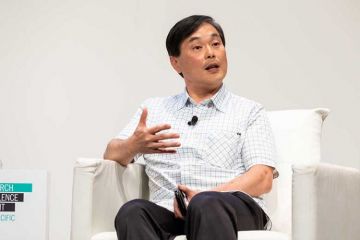Britain’s golden year of Nobel success also highlights its universities’ inadequate efforts to retain top research talent, because none of its laureates are based in UK academia, experts have suggested.
After a barren few years, Britain saw its biggest-ever crop of UK-educated laureates in a single year, with four British-born winners and a further two laureates – economist Daron Acemoglu, who moved from Turkey to study at the University of York in the 1980s, and US chemist John Jumper, who has an MPhil from the University of Cambridge – having studied in the UK.
The only comparable year is 2016, when there were five British-born laureates, with the total haul from the 2010s (14 winners) contrasting with just eight winners in the 1980s and eight in the 1990s, excluding literature and peace prizes, according to a Sutton Trust analysis.
With all three UK-educated economics Nobel winners based in the US, artificial intelligence pioneer Geoffrey Hinton – who took this year’s physics prize – leaving the UK in the 1980s, and chemistry laureates Sir Demis Hassabis and Dr Jumper based at Google’s AI arm DeepMind, this year’s success posed questions about why UK-based talent has continually gone overseas or moved out of academia, said Paul Nightingale, a professor of strategy based at the University of Sussex’s Science Policy Research Unit.
“Science is an international activity, and it’s good that people move around – it makes science as a whole better, so we should support this,” said Professor Nightingale. “But there is a political feature of this transfer of capacity because there are winners and losers, and it’s not just about how many arrive or leave the UK but who remains.”
“For instance, Geoffrey Hinton was based at Sussex, but could not get any money during the ‘AI winter’ when it was decided this was all just hype,” continued Professor Nightingale. “He went off to America, then Toronto, so people might wonder why the Toronto AI cluster isn’t actually in Brighton.”
This year’s clutch of UK-educated Nobelists – including those born in Turkey and the US – should also prompt questions about whether the UK is providing sufficient support to retain top talent, added Professor Nightingale.
“It is fantastic that we can attract these people here – and there are many stunningly good researchers in our universities – but we need to ensure these people settle down here,” he continued.
“Countries like Denmark, Switzerland and Canada are offering some very sweet deals to researchers, while China and Singapore are very proactive on this front. When it comes to talent management, we are very passive while other nations are actively courting the best talent.”
John Womersley, a former executive chair of the Science and Technology Facilities Council, said he agreed that “UK connections like these to Nobelists are never bad news”.
But, “given the Nobel-winning AI research was done at DeepMind rather than in one of our academic institutions, it’s a good advertisement for the UK and maybe less so for UK academia”, said Professor Womersley, now based at the universities of Oxford and Edinburgh.
Alicia Greated, executive director of the Campaign for Science and Engineering, said this year’s Nobels “highlight the strength of the UK’s research base and the vital need for ongoing support for science education at all levels”.
“This success story also reflects the importance of international mobility, showcasing how diverse experiences are crucial to innovation and excellence in academia,” she added.
Register to continue
Why register?
- Registration is free and only takes a moment
- Once registered, you can read 3 articles a month
- Sign up for our newsletter
Subscribe
Or subscribe for unlimited access to:
- Unlimited access to news, views, insights & reviews
- Digital editions
- Digital access to THE’s university and college rankings analysis
Already registered or a current subscriber?









